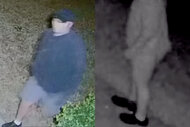Create a free profile to get unlimited access to exclusive videos, breaking news, sweepstakes, and more!
How To Stay Safe: Tips On How To Report A Missing Child
If a child goes missing it can be a stressful and scary time for any caregiver, especially if they’re unsure of what steps to take after their young one has seemingly vanished.

In 2018, there were 424,066 reports of missing children made to law enforcement, according to the National Center for Missing and Exploited Children’s website.
According to the National Crime Information Center’s Missing Person File, 29,758 cases regarding juveniles under the age of 18 remained active by the end of 2018 in the United States. Meaning, the child remained missing.
Here are five tips on reporting a missing child.
Number One: Check with loved ones and search your surroundings.
If a child is young, check hiding places. The National Center for Missing & Exploited Children, or the NCMEC, recommends to check closets, piles of laundry, in and under beds, inside large appliances, vehicles including trunks, and other possible spots a child can crawl to or hide in.
Don’t waste time if you suspect a child is missing, Angeline Hartmann, media director for the NCMEC and the host of the “Inside Crime...” podcast, told Oxygen.com.
“But they also should make sure to do their due diligence,” Hartmann said. “Did they check the friend's house? Did they look in certain areas on their property?”
If you lost your child in a store, notes the NCMEC, notify the store manager.
Number Two: Report immediately.
Hartmann said to call police the minute you suspect a child might be missing.
"Time is critical in every case,” Hartmann said. “And so, no matter what the situation is, if you think that your child might be missing call police. Get help immediately."
After you contact authorities, Hartmann recommends parents or guardians reach out to the NCMEC so they can help plan next steps.
Number Three: Prepare yourself to give helpful information to authorities.
Remember to think about key details like the child’s height, weight, and other unique characteristics like braces or eyeglasses. If a child has any medical conditions or requires medication, notify law enforcement working the case.
Have an up to date photo ready of your child and help create a missing child poster that can be distributed online or in the surrounding area. Hartmann recommends the poster should include unique characteristics like if the child walks or talks a certain way or has identifiers like a mole or birthmark.
The NCMEC notes on its website, request law enforcement enter your child’s name and information into the FBI’s National Crime Information Center Missing Person File right away. The electronic database can give criminal justice agencies across the country easier access to the information, according to the FBI’s website.
Number Four: Be aware of your child’s social media accounts and try to keep a spotlight on the case.
Alert authorities to any of your child’s social media accounts. Getting media attention is important, too.
“Make every effort to obtain local and national media attention regarding your missing child. Conduct television, radio, and newspaper interviews to discuss and direct attention to your child,” states a missing-child reference guide for families, created by the NCMEC, Office Juvenile Justice and Delinquency Prevention, and Amber Alert.
Hartmann adds parents can work with a case manager at the NCMEC and the media department to try to keep a spotlight on their missing child.
"We will work to help you get your child's case out there whether your child's been missing for one day or one decade,” Hartmann said.
Number Five: If your child remains missing for a long period time, Hartmann says parents can try to maintain a relationship with the investigator.
“Make sure that you do your best to communicate with police,” Hartmann said. “It's very, very important that you're on the same page with the person who's investigating your child's case. Try to get updates from them...”
To learn more about resources the NCMEC offers, go to their website.













